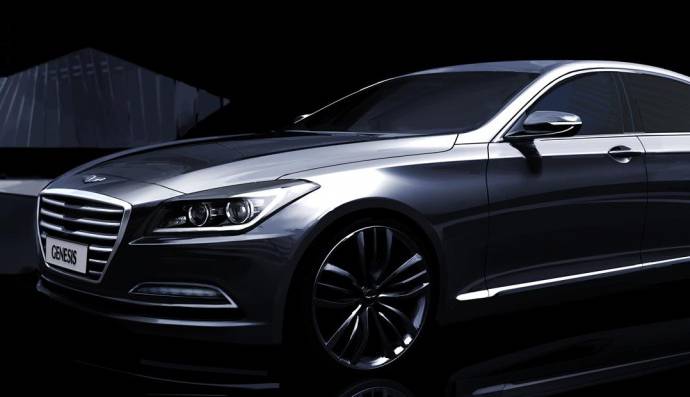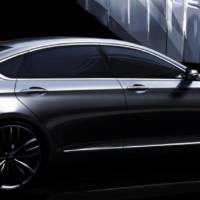Hyundai Motor Company, South Korea’s largest automaker, today held an ‘all-new Genesis sedan Media Preview’ for the Korean media at Hyundai Motor Group’s R&D Centre and officially unveiled the first image renderings of the car. The purpose of the pre-launch media event was to promote its domestic launch scheduled later this year. Staging its world-premiere in Korea, the all-new Genesis sedan will debut in major markets next year.
Since its introduction in 2009, Hyundai’s unique design philosophy ‘Fluidic Sculpture’ has evolved to the next level and the all-new Genesis sedan is the first model to adopt Fluidic Sculpture 2.0.
While maintaining its original essence, Fluidic Sculpture 2.0 is defined by core elements: Simple and harmonious design with refined fluidic design elements, modern Hyundai look with a singular hexagonal grille, easy-to-understand and pleasant design and rich visuotactile colour, material and finishing of the car.
Designed based on this new philosophy, the all-new Genesis boasts a premium sports sedan look with refined, ‘in-motion’ design aesthetics. A single-frame premium hexagonal grille makes a bold front statement, while fluidic and voluminous surfacing complete the side lines. Meanwhile, the high-tech, sculptural surface emphasizes the rear design.
The all-new Genesis sedan also focuses on Human Machine Interface (HMI), which lets drivers intuitively recognize vehicle functions, allowing for more convenient and effective use of those functions.
Switches are categorized depending on their function, facilitating easier control. Symbols are standardized for intuitive recognition, and the feel of the grip and control have been improved as well.
Starting with the all-new Genesis sedan, future models will be designed based on Fluidic Sculpture 2.0 and its HMI principles.
The all-new Genesis sedan significantly improved its safety in crash tests due to improved body structure and rigidity.
Its torsional and bending stiffness have been increased by applying more ultra-high-strength steel, hot-stamping and double-section structure on the front, partitioned engine room design as well as improved rear and centre floor structures.
Passenger safety has been improved by the application of advanced seatbelt functions such as Emergency Fastening Device system (EFD), which tightly fastens passengers in crashes, and Pre-Safe seatbelt, which warns of danger in advance by tightening the seatbelt.
With improved suspension and application of various advanced technologies, the all-new Genesis sedan offers top-class driving and ride & handling performances. Greatly improved lateral stiffness of the front and rear suspensions and excellent weight balance contribute to the making of a stable chassis. Meanwhile, application of electronic control suspension such as Advanced Traction Cornering Control (ATCC) enables greater stability in corners.
Furthermore, Rack-mounted Motor Driven Electric Power Steering (R-MDPS) was first applied to the model with a variable gear ratio, which provides high-speed stability and direct response at low and medium speeds.





